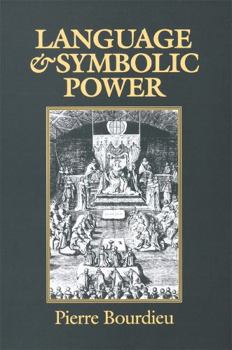Language and Symbolic Power
Select Format
Select Condition 
Book Overview
This volume brings together Pierre Bourdieu's highly original writings on language and on the relations among language, power, and politics. Bourdieu develops a forceful critique of traditional approaches to language, including the linguistic theories of Saussure and Chomsky and the theory of speech-acts elaborated by Austin and others. He argues that language should be viewed not only as a means of communication but also as a medium of power through...
Format:Paperback
Language:English
ISBN:0674510410
ISBN13:9780674510418
Release Date:December 1999
Publisher:Harvard University Press
Length:320 Pages
Weight:1.04 lbs.
Dimensions:0.9" x 6.0" x 9.1"
Customer Reviews
2 ratings
Sociology and Language
Published by Thriftbooks.com User , 21 years ago
Bourdieu's point is not to explore linguistics but rather to explore the larger impact that language has on shaping symbols, meaning and power in the social context. Symbolic interactionists and conflict theorists would probally find this book to be a great read.
abstract but has a lot of potential
Published by Thriftbooks.com User , 23 years ago
This book will most likely not appeal to US students in linguistics. Because Bourdieu deals with rather abstract concepts which cover a lot of social ground (e.g., symbolic, cultural, economic capital, field, etc.)and not enough linguistic ground, some linguists will have trouble applying concepts to the actual production of speech at the phonological, morpho-syntactic, pragmatic and discourse level. He never really deals with actual production of language by speakers, so it creates a lot of work for the reader to fill in the details of what, for example, an actual linguistic habitus might look like, what its dispositions might be, and how they might be coordinated in their habitus set.However, unlike many US linguists, he assumes there is an empirical connection between language use and larger social domains; furthermore, he is able to explain the way power often operates through exclusion and devaluation (dialect analysis). One of the less abstract chapters, the chapter on Searle, is excellent. Bourdieu accurately locates the efficacy of the speech act, not in the functional form of the utterances, such as christening, ordering, requesting, etc., but in the recognition by all involved that the agent who produces the speech act has the right to be obeyed and that the material circumstances of the speech act are appropriate. Mary Jane down the street and the mayor of NY may christen a new warship using the exact same functional words, but the power of those words depends on our recognition that, in this example, the mayor, not just anybody, has the authority to name. Bourdieu masterfully argues this point, and I would recommend reading that chapter first for its accessibility and accuracy in pointing out that the extra-linguistic is as much linguistic as the linguistic.






